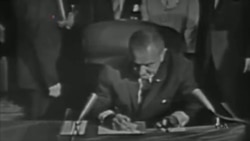Fifty years ago, lawmakers approved, and U.S. President Lyndon Johnson signed, the Voting Rights Act of 1965. The measure outlawed racial discrimination in voting and provided the necessary federal enforcement to allow millions of blacks in many parts of the southern United States to exercise their right to vote. The law followed years of protests, civil unrest and bloodshed.
The law is widely considered to be the most effective piece of civil rights legislation ever enacted in the United States.
* President Obama explains importance of Voting Rights Act
"We will not turn aside until Americans of every race and color and origin in this country have the same right as all others to share in the process of democracy," said President Lyndon Johnson.
WATCH: Related video report by Chris Simkins
The Voting Rights Act wiped out state and local barriers at the ballot box in communities throughout the South that racially discriminated against black voters. It also provided for federal enforcement of the 15th amendment of the U.S. Constitution, which gave African Americans the right to vote.
"The [Voting Rights] Act of 1965 freed and liberated so many people," said John Lewis, a U.S. Congressman.
Lewis was nearly killed during a voting rights march in Selma, Alabama in 1965. Scenes of the violent confrontation, in which police attacked peaceful demonstrators, caused a national outcry and led to swift passage of the Voting Rights Act.
"It was worth the suffering of so many people. It was worthy of the blood that some of us gave," he said.
Political science professor Andra Gillespie said large-scale government-backed efforts were launched to register black voters.
"The voting rate among African Americans climbs exponentially during the latter part of the 1960s and early part of the 1970s. So there were places in the South, states where hundreds or thousands of blacks could vote," said Gillespie.
Black leaders say the sacrifices made to win voting rights should be celebrated and never forgotten. Leo Smith directs minority engagement for the Georgia Republican Party.
"I am proud that we have gone from a society where I might have been attacked and beat down like John Lewis was. He took those wounds for me. Don't waste the blood that was spilled by pretending that his suffering meant nothing," said Smith.
Fifty years later former Atlanta Mayor Shirley Franklin remembers how the 1965 Voting Rights Act gave her an opportunity to seek elective office.
"Fortunately other people saw something in me that I didn't see in myself. They encouraged me to step out of my comfort zone and to run for office. My mission since that time has been to encourage people to do the same," said Franklin.
Political analysts say the Voting Rights Act was a victory for the nation by making one of the most powerful instruments in a democracy -- the vote -- fair and equitable.











